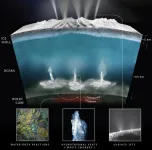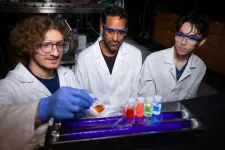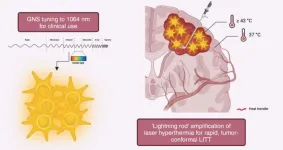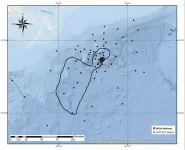(Press-News.org) We’ve all seen the surreal footage in nature documentaries showing hydrothermal vents on the frigid ocean floor—bellowing black plumes of super-hot water—and the life forms that cling to them. Now, a new study by UC Santa Cruz researchers suggests that lower-temperature vents, which are common across Earth's seafloor, may help to create life-supporting conditions on "ocean worlds" in our solar system.
Ocean worlds are planets and moons that have—or had in the past—a liquid ocean, often under an icy shell or within their rocky interior. In Earth's solar system, several of Jupiter's and Saturn's moons are ocean worlds, and their existence has motivated everything from peer-reviewed academic studies and spacecraft missions with satellites, to popular movies like the 2013 sci-fi thriller, The Europa Report.
Many lines of research suggest that some ocean worlds release enough heat internally to drive hydrothermal circulation under their seafloors. This heat is generated by radioactive decay, as occurs deep in the Earth, with additional heat possibly generated by tides.
Rock-heat-fluid systems were discovered on Earth's seafloor in the 1970s, when scientists observed discharging fluids that carried heat, particles, and chemicals. Many vent sites were surrounded by novel ecosystems, including specialized bacterial mats, red-and-white tubeworms, and heat-sensing shrimp.
Simulating alien seafloors
In this new study, published today in the Journal of Geophysical Research: Planets, the researchers used a complex computer model based on hydrothermal circulation as it occurs on Earth. After changing variables like gravity, heat, rock properties and fluid-circulation depth, they found that hydrothermal vents could be sustained under a wide range of conditions. If these kinds of flows occur on an ocean world, like Jupiter’s moon Europa, they could raise the odds that life exists there as well.
"This study suggests that low temperature (not too hot for life) hydrothermal systems could have been sustained on ocean worlds beyond Earth over timescales comparable to that required for life to take hold on Earth," said Andrew Fisher, study lead author and a distinguished professor of earth and planetary sciences (EPS) at UC Santa Cruz.
The seawater-circulation system that the team based their computer models on was found on a 3.5 million-year-old seafloor in the northwestern Pacific Ocean, east of the Juan de Fuca Ridge. There, cool bottom water flows in through an extinct volcano (seamount), travels underground for about 30 miles, then flows back out into the ocean through another seamount. "The water gathers heat as it flows and comes out warmer than when it flowed in, and with very different chemistry," explained Kristin Dickerson, the paper's second author and a Ph.D. candidate in earth and planetary sciences.
The flow from one seamount to another is driven by buoyancy, because water gets less dense as it warms, and more dense as it cools. Differences in density create differences in fluid pressure in the rock, and the system is sustained by the flows themselves—running as long as enough heat is supplied, and rock properties allow enough fluid circulation. "We call it a hydrothermal siphon," Fisher said.
Earth’s cooling system
While high-temperature vent systems are driven mainly by sub-seafloor volcanic activity, Fisher explained that a much larger volume of fluid flows in and out of Earth's seafloor at lower temperatures, driven mainly by "background" cooling of the planet. "The flow of water through low-temperature venting is equivalent, in terms of the amount of water being discharged, to all of the rivers and streams on Earth, and is responsible for about a quarter of Earth's heat loss," he said. "The entire volume of the ocean is pumped in and out of the seafloor about every half-million years."
Many previous studies of hydrothermal circulation on Europa and Enceladus, a small moon orbiting Saturn, have considered higher temperature fluids. Cartoons and other drawings often depict systems on their seafloors that look like black smokers on Earth, according to Donna Blackman, an EPS researcher and third author on the new paper. "Lower-temperature flows are at least as likely to occur, if not more likely," she said.
The team was particularly excited about one result from the computer simulations featured in the new paper showing that, under very low gravity—like that found on the seafloor of Enceladus—circulation can continue with low to moderate temperatures for millions or billions of years. This could help to explain how small ocean worlds can have long-lived fluid-circulation systems below their seafloors, even though heating is limited: the low efficiency of heat extraction could lead to considerable longevity—essentially, throughout the life of the solar system.
Planetary scientists are looking to observations from satellite missions to help determine what kinds of conditions are present or possible on ocean worlds. The authors of the new paper plan to attend the launch of the Europa Clipper spacecraft later this fall at Cape Canaveral, Fla., along with colleagues collaborating on the Exploring Ocean Worlds project.
The researchers acknowledge the uncertainty of when the seafloors of ocean worlds will be directly observed for the presence of active hydrothermal systems. Their distance from Earth and physical characteristics present major technical challenges for spacecraft missions. “Thus, it is essential to make the most of available data, much of it collected remotely, and leverage understanding from decades of detailed studies of analog Earth systems,” they conclude in the paper.
In addition to the UC Santa Cruz team, the paper included co-authors from the Blue Marble Space Institute of Science, Woods Hole Oceanographic Institution, and Laboratoire de Planétologie et Géodynamique de Nantes. The study, “Sustaining Hydrothermal Circulation with Gravity Relevant to Ocean Worlds,” was funded by the NASA Astrobiology Program (award #80NSSC19K1427) and the National Science Foundation (OCE-1924384).
END
Hydrothermal vents on seafloors of ‘ocean worlds’ could support life, new study says
UC Santa Cruz team led research using computer simulations based on Earth’s seafloor ecosystems
2024-06-24
ELSE PRESS RELEASES FROM THIS DATE:
New USF study: Mindfulness and managing emotions lead to better sleep
2024-06-24
Media Contact:
John Dudley
(814) 490-3290 (cell)
jjdudley@usf.edu
TAMPA, Fla. (June 24, 2024) – Mindfulness – focusing on the present moment – can improve sleep, reduce stress and improve overall health. A new University of South Florida-led study helps explain why.
Researchers studied 144 nurses over two weeks to see how well they could stay focused on the present and how often they fixated on negative thoughts. The nurses completed surveys three times a day and reported their sleep quality the following morning.
The findings shed light on how mindfulness relates to emotion ...
JACC to serve cardiovascular community, shape future under new editor
2024-06-24
The first issue of JACC, the flagship journal of the American College of Cardiology, under new Editor-in-Chief Harlan M. Krumholz, MD, SM, FACC, publishes today, ushering in a new era of one of the world’s leading scholarly journals.
“I envision JACC, with all its strengths, as a transformative platform for building community, elevating strong science, influencing clinical practice, supporting career development, and improving patient outcomes.” Krumholz said in his Editor’s Page. “JACC and its group of journals can play a pivotal role in serving our community and shaping the future.”
Under his editorship, JACC will be guided by ...
Revived technology used to count individual photons from distant galaxies
2024-06-24
Using an instrument on the 4.1-meter Southern Astrophysical Research Telescope, researchers obtained the first astronomical spectrum using skipper charge-coupled devices (CCDs).
The results were presented on June 16 at the Society of Photo-Optical Instrumentation Engineers Astronomical Telescopes + Instrumentation meeting in Japan by Edgar Marrufo Villalpando, a physics PhD candidate at the University of Chicago and a Fermilab DOE Graduate Instrumentation Research Award Fellow.
“This is a major milestone for skipper-CCD technology,” said Alex Drlica-Wagner, a cosmologist at the U.S. Department of Energy’s Fermi ...
U of T researchers develop RNA-targeting technology for precisely manipulating parts of human genes
2024-06-24
Researchers at the University of Toronto have harnessed a bacterial immune defense system, known as CRISPR, to efficiently and precisely control the process of RNA splicing.
The technology opens the door to new applications, including systematically interrogating the functions of parts of genes and correcting splicing deficiencies that underlie numerous diseases and disorders.
“Almost all human genes produce RNA transcripts that undergo the process of splicing, whereby coding segments, called exons, are joined together and non-coding segments, called introns, are removed and typically degraded,” said Jack Daiyang Li, first author on the study and PhD student ...
NexusXp™ – SLAS’s new interactive pavilion at SLAS2025 will showcase automation integration and collaboration
2024-06-24
Oak Brook, IL – The Society for Laboratory Automation and Screening (SLAS) will launch NexusXp, its new interactive pavilion at SLAS2025 to showcase collaborative and integrated lab automation scenarios. NexusXp combines Nexus, the Latin word for link or connection where multiple elements meet, with the modern “Xp” to signify the “Xperience” of making that critical link or connection. Through this new pavilion, SLAS will demonstrate how automation integration transforms research and enables scientific breakthroughs.
“NexusXp is an exclusive event or attendee ...
Engineers developing atom-thick material for efficient, ultrafast, light-based electronics
2024-06-24
AMES, Iowa – A Google Cloud video takes you inside a company data center in
southwest Iowa’s Council Bluffs.
There you are, in the middle of a long, industrial corridor. You slowly move past rack after rack after rack of the computer servers that are, Google says, “helping to keep the internet humming 24/7.”
Part of that hum is the power that keeps those data centers up and running.
“Think about when you use your computer,” said Matthew ...
Study reveals same genes that can drive cancer also guide neural-circuit growth
2024-06-24
LAWRENCE — Many people are familiar with oncogenes — genes long known to be involved in cancers in humans, such as the gene “Src.”
What’s less widely understood is that oncogenes didn’t evolve just to cause cancer in species, but rather to control events of normal growth and differentiation.
“As an organism grows from a single fertilized egg to form all the different tissue types, these oncogenes, including Src, evolved to control these normal events,” said Erik Lundquist, professor of molecular ...
Leveraging gold nanostars for precision laser interstitial thermal therapy
2024-06-24
“Gold nanostars amplify brain-tumor selective laser interstitial thermal therapy.”
BUFFALO, NY- June 24, 2024 – A new editorial paper was published in Oncotarget's Volume 15 on June 14, 2024, entitled, “Leveraging gold nanostars for precision laser interstitial thermal therapy.”
In this new editorial, researchers Aden P. Haskell-Mendoza, Ethan S. Srinivasan, Tuan Vo-Dinh and Peter E. Fecci from Duke University discuss laser interstitial thermal therapy (LITT). Over the past decade, LITT has become an important tool for the neurosurgical treatment of a variety of intracranial pathologies, including focal epilepsies, vascular malformations, and ...
Biodiversity loss from 2010 oil spill worse than predicted
2024-06-24
A new peer-reviewed study from researchers at The University of Texas at Arlington; the University of Nevada, Reno; Mokwon University in Daejeon, Korea; and Texas A&M University at Corpus Christi shows the Deepwater Horizon (DWH) oil spill of 2010 affected wildlife and their habitat much more than previously understood.
“Overall, we found the area of deep-sea floor affected by the DWH spill was significantly larger than previously thought,” said Masoud Rostami, an author of the study and assistant ...
New model shows more realistic picture of intimate partner violence
2024-06-24
ITHACA, N.Y. – Intimate partner violence is notoriously underreported and correctly diagnosed at hospitals only around a quarter of the time, but a new method provides a more realistic picture of who is most affected, even when cases go unrecorded.
PURPLE (Positive Unlabeled Relative PrevaLence Estimator), an algorithm developed by researchers at Cornell University, estimates how often underreported health conditions occur in different demographic groups. Using hospital data, the researchers showed that PURPLE can better quantify which groups of women are most likely to experience intimate partner violence compared with methods that ...
LAST 30 PRESS RELEASES:
Heart attack deaths rose between 2011 and 2022 among adults younger than age 55
Will melting glaciers slow climate change? A prevailing theory is on shaky ground
New treatment may dramatically improve survival for those with deadly brain cancer
Here we grow: chondrocytes’ behavior reveals novel targets for bone growth disorders
Leaping puddles create new rules for water physics
Scientists identify key protein that stops malaria parasite growth
Wildfire smoke linked to rise in violent assaults, new 11-year study finds
New technology could use sunlight to break down ‘forever chemicals’
Green hydrogen without forever chemicals and iridium
Billion-DKK grant for research in green transformation of the built environment
For solar power to truly provide affordable energy access, we need to deploy it better
Middle-aged men are most vulnerable to faster aging due to ‘forever chemicals’
Starving cancer: Nutrient deprivation effects on synovial sarcoma
Speaking from the heart: Study identifies key concerns of parenting with an early-onset cardiovascular condition
From the Late Bronze Age to today - Old Irish Goat carries 3,000 years of Irish history
Emerging class of antibiotics to tackle global tuberculosis crisis
Researchers create distortion-resistant energy materials to improve lithium-ion batteries
Scientists create the most detailed molecular map to date of the developing Down syndrome brain
Nutrient uptake gets to the root of roots
Aspirin not a quick fix for preventing bowel cancer
HPV vaccination provides “sustained protection” against cervical cancer
Many post-authorization studies fail to comply with public disclosure rules
GLP-1 drugs combined with healthy lifestyle habits linked with reduced cardiovascular risk among diabetes patients
Solved: New analysis of Apollo Moon samples finally settles debate about lunar magnetic field
University of Birmingham to host national computing center
Play nicely: Children who are not friends connect better through play when given a goal
Surviving the extreme temperatures of the climate crisis calls for a revolution in home and building design
The wild can be ‘death trap’ for rescued animals
New research: Nighttime road traffic noise stresses the heart and blood vessels
Meningococcal B vaccination does not reduce gonorrhoea, trial results show
[Press-News.org] Hydrothermal vents on seafloors of ‘ocean worlds’ could support life, new study saysUC Santa Cruz team led research using computer simulations based on Earth’s seafloor ecosystems








